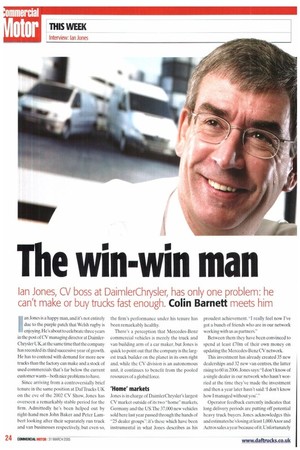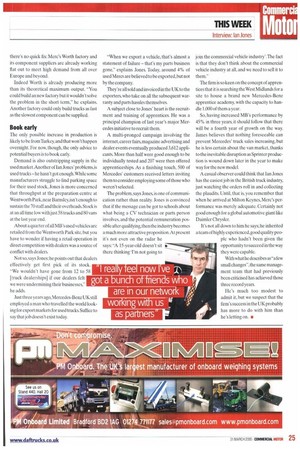The win-win man
Page 26

Page 27

If you've noticed an error in this article please click here to report it so we can fix it.
Ian Jones, CV boss at DaimlerChrysler, has only one problem: he can't make or buy trucks fast enough. Conn Barnett meets him
Ian Jones is a happy man, and it's not entirely due to the purple patch that Welsh rugby is enjoying. He's about to celebrate three years in the post of CV managing director at DaimlerChrysler UK,at the same time that the company has recorded its third successive year of growth. He has to contend with demand for more new trucks than the factory can make and a stock of used commercials that's far below the current customer wants —both nice problems to have.
Since arriving from a controversially brief tenure in the same position at Daf Trucks UK on the eve of the 2002 CV Show, Jones has overseen a remarkably stable period for the firm. Admittedly he's been helped out by right-hand men John Baker and Peter Lambert looking after their separately run truck and van businesses respectively, but even so, the firm's performance under his tenure has been remarkably healthy.
There's a perception that Mercedes-Benz commercial vehicles is merely the truck and van building arm of a car maker, but Jones is quick to point out that the company is the largest truck builder on the planet in its own right and, while the CV division is an autonomous unit, it continues to benefit from the pooled resources of a global force.
'Home' markets Jones is in charge of DaimlerChrysler's largest CV market outside of its two "home" markets, Germany and the US.The 37.000 new vehicles sold here last year passed through the hands of "25 dealer groups": it's these which have been instrumental in what Jones describes as his proudest achievement. "I really feel now I've got a bunch of friends who are in our network working with us as partners."
Between them they have been convinced to spend at least £70m of their own money on updating the Mercedes-Benz CV network.
This investment has already created 35 new dealerships and 32 new van centres, the latter rising to 60 in 2006. Jones says: "I don't know of a single dealer in our network who hasn't worried at the time they've made the investment and then a year later hasn't said: 'I don't know howl managed without you'."
Operator feedback currently indicates that long delivery periods are putting off potential heavy truck buyers. Jones acknowledges this and estimates he's losing at least 1,000 Axor and Actros sales a year because of it. Unfortunately there's no quick fix: Merc's Worth factory and its component suppliers are already working flat out to meet high demand from all over Europe and beyond.
Indeed Worth is already producing more than its theoretical maximum output. "You could build an new factory but it wouldn't solve the problem in the short term," he explains. Another factory could only build trucks as fast as the slowest component can be supplied.
Book early
The only possible increase in production is likely lobe from Turkey, and that won't happen overnight. For now, though, the only advice to potential buyers is to book early.
Demand is also outstripping supply in the used market.Another of Ian Jones' problems,is used truckshe hasn't got enough.While some manufacturers struggle to find parking space for their used stock, Jones is more concerned that throughput at the preparation centre at Wentworth Park near Bamsley,isn't enough to sustain the 70 staff and their overheads. Stock is at an all time low with just 58 trucks and 80 vans at the last year end.
About a quarter of all MB's used vehicles are retailed from the Wentworth Park site, but you have to wonder if having a retail operation in direct competition with dealers was a source of conflict with dealers.
Not so, says Jones: he points out that dealers effectively get first pick of its stock. -We wouldn't have gone from 12 to 58 [truck dealerships] if our dealers felt we were undermining their businesses," he adds.
Just three years ago, Mercedes-Benz UK still employed a man who travelled the world looking for export markets for used trucks. Suffice to say that job doesn't exist today. -When we export a vehicle, that's almost a statement of failure that's my parts business gone," explains Jones. Today, around 4% of used Mercs are believed to be exported, but not by the company.
They're all sold and invoiced in the UK to the exporters, who take on all the subsequent warranty and parts hassles themselves.
A subject close to Jones' heart is the recruitment and training of apprentices. He was a principal champion of last year's major Mercedes initiative to recruit them.
A multi-pronged campaign involving the internet, career fairs, magazine advertising and dealer events eventually produced 3,612 applicants. More than half were good enough to be individually tested and 207 were then offered apprenticeships. As a finishing touch, 500 of Mercedes' customers received letters inviting them to consider employing some of those who weren't selected.
The problem, says Jones, is one of communication rather than reality. Jones is convinced that if the message can be got to schools about what being a CV technician or parts person involves, and the potential remuneration possible after qualifying,then the industry becomes a much more attractive proposition. At present it's not even on the radar he says: "A 15-year-old doesn't sit to there thinking 'I'm not going to join the commercial vehicle industry'. The fact is that they don't think about the commercial vehicle industry at all, and we need to sell it to them."
The firm is so keen on the concept of apprentices that it is searching the West Midlands for a site to house a brand new Mercedes-Benz apprentice academy, with the capacity to handle 1,000 of them a year.
So, having increased MB's performance by 45% in three years, it should follow that there will be a fourth year of growth on the way. James believes that nothing foreseeable can prevent Mercedes' truck sales increasing, but he is less certain about the van market, thanks to the inevitable disruption as Sprinter production is wound down later in the year to make way for the new model.
A casual observer could think that Ian Jones has the easiest job in the British truck industry, just watching the orders roll in and collecting the plaudits. Until, that is, you remember that when he arrived at Milton Keynes, Merc's performance was merely adequate. Certainly not good enough for a global automotive giant like Daimler Chrysler.
It's not all down to him he says; he inherited a team of highly experienced,good quality people who hadn't been given the opportunity to succeed in the way they were capable.
With what he describes as"a few small changes", the same management team that had previously been criticised has achieved those three record years.
He's much too modest to admit it, but we suspect that the firm's success in the UK probably has more to do with him than he's letting on. •






















































































































































































































